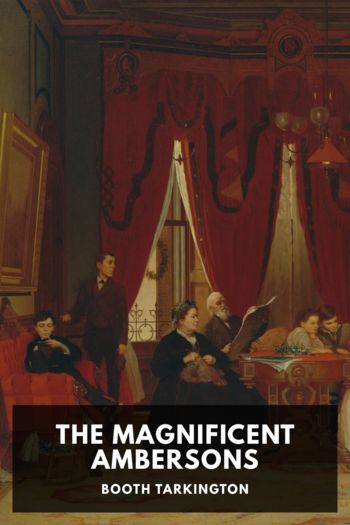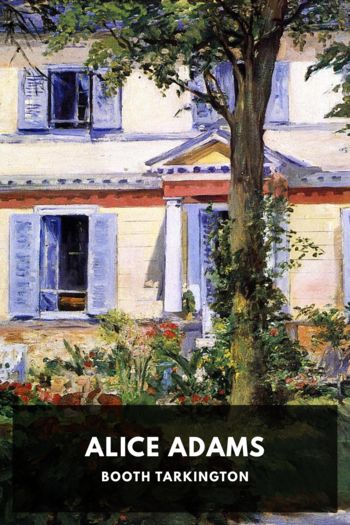National Avenue by Booth Tarkington (book recommendations website .txt) 📕

- Author: Booth Tarkington
Book online «National Avenue by Booth Tarkington (book recommendations website .txt) 📕». Author Booth Tarkington
“And how beautifully you did do it!” her brother exclaimed. “His mother told me about your screaming and storming at Dan after he brought that miserable boy home. Do you think I didn’t understand? You wanted a quarrel to justify your going, so that the real reason wouldn’t be suspected. You’d seen that singing beef again, and you meant to see him again—oh, I kept near you that night, and I read you, every instant! You haven’t fooled me about what gave you the ‘courage,’ Lena! It was indeed ‘the breath of art,’ old girl, and not ‘the trouble about Henry!’ You made that quarrel with Dan deliberately. It was to cover what you weren’t thoroughbred enough to face. You weren’t honest enough to—”
“At least I’m honest enough to tell you that you’re wasting your breath,” Lena said coolly. “You want to take Henry home with you, but he doesn’t care to go. He behaved idiotically there—it isn’t a good place for him—and of course, under the circumstances, he’s embarrassed about going back. He wants to stay with me just now, and he’ll do what I tell him. You can’t take him back with you, but if you’ll obtain a proper allowance for me, or a settlement, from my husband, I’ll arrange later for Henry to spend a part of his time with his father. That’s absolutely the best I’ll do, and you’d better run back and make it quite clear to Dan. I bear him no ill will, and I’ll be perfectly fair with him on the terms I’ve just mentioned.”
Her brother’s bitterness with her was not abated; but to effect his purpose he tried more reasonable persuasions, and when these were unavailing, raged again. All he did was useless; he could neither shake her nor exert the slightest influence upon Henry, though he continued the siege for three days over the four that he had promised. Then he returned, a defeated but fuming negotiator, to report his failure. His final instructions from his sister were to make it quite clear to Dan that she bore him no ill will and wished him well.
But when George reached the old house of the Oliphants, driving there directly from the train, he was told that he could not make her message clear to her husband; that he could not make anything clear to him.
Harlan took the dismayed traveller into the library. “The doctor says the trouble is there isn’t anything to build up a resistance,” Harlan said. “You see Dan’s never taken any care of his health—‘too busy,’ of course—and he’s exhausted his vitality. He caught a fearful cold going round in the rain hunting for that precious boy of his, and instead of staying in bed and nursing himself, he was hustling all over the place in a drizzle the next morning. He was all run-down to start with, and his system couldn’t afford it. At least, that’s what they told us after the consultation yesterday afternoon.”
“Consultation?” McMillan repeated blankly, though Harlan’s manner had already prepared him for words worse than this.
Harlan sighed audibly, and shook his head. “Both lungs are congested, they told us early this morning. He can’t—” He went to the bay window and looked down at the slightly frayed upholstery of the easy-chair it had once been his wont to occupy there. “Well, at your age and mine we’ve had experience of sickness enough to know that nobody can stand that long.”
“Yes,” McMillan groaned. “I suppose so.”
“I think we won’t tell him you’ve got back,” Harlan said. “He’s asked about it every now and then—wants to know if you’ve brought Henry yet. It’ll be better to let him keep on expecting him than to tell him you’ve come back alone. I telegraphed you after the consultation, but by that time you’d already left New York, of course.”
“Yes; it didn’t reach me.”
Then, for a time, neither of them found more to say. Harlan, near the window, stared out into the smoke haze that a cloudy day held down upon the city; McMillan sat frowning at the floor, and the room was vaguely noisy with a confusion of sounds from outdoors: hammerings and clatterings of steel where buildings were going up; the rending of timbers and crashes and shoutings where they were going down; the uproar of ponderous trucks grinding by upon the brick-paved cross street to the south, so that the strong old house trembled with the subterranean communication of their vibrations—all to the incessantly rasped accompaniment of motor signals on the avenue.
“Isn’t this a hell to be sick in?” Harlan asked, turning abruptly to McMillan. “We couldn’t raise the windows to give him air without giving him this infernal smoke that makes him cough harder. And the noise—there’s hardly a respite from it all night long! When the workmen go home the joy-riders and the taxis keep it up till daylight. He was too sick to be taken to a hospital or—” He interrupted himself with a desperate laugh. “We almost had to! Yesterday morning the servants called me, and I found the house full of men; they’d brought trucks right across the lawn, and started to work. They’d come to wreck the house—to tear it down. I told the foreman my brother was very sick, and he said in that case we’d better take him to a hospital; he had his orders from the contractor, and he was going ahead! Some of his men were already on the roof, making a horrible noise and tearing away the slate—throwing it down into the yard under Dan’s window. I had hard work to get rid of them; and they left a great hole in the roof when they went. My heaven! when such things happen how’s anybody ever to see any meaning in life?”
“I don’t know!” George groaned. “I don’t see much meaning in anything—not after what you’ve told me about Dan’s condition.”
“McMillan, I don’t see a bit of meaning to the whole miserable business. Here’s my





Comments (0)